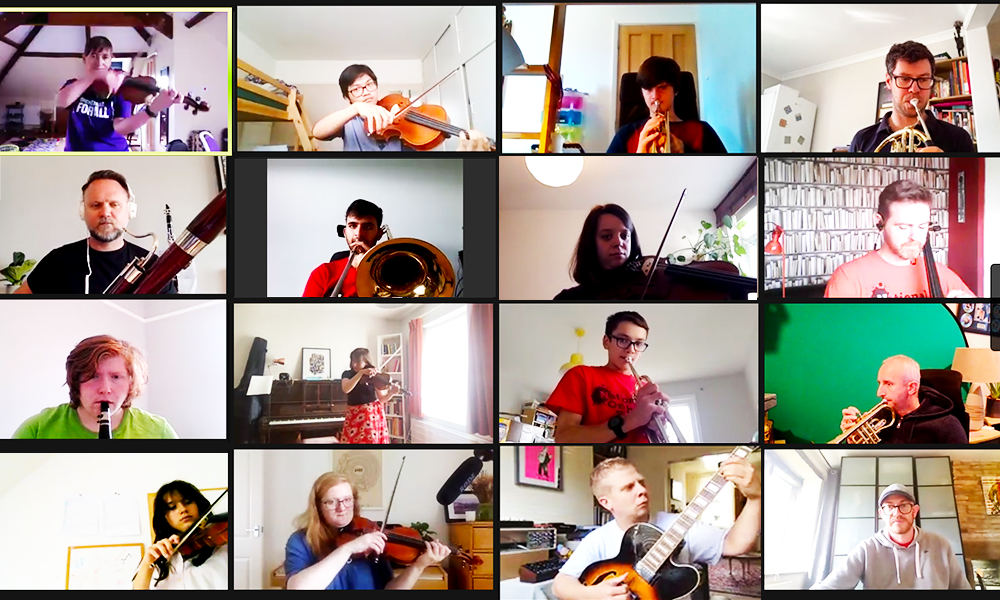From starting his musical journey and getting through the pandemic to the perks of playing music with others, National Orchestra for All composer Jack McNeill reveals all…
What’s your earliest musical memory?
Learning a piece called ‘Knickerbocker Glory’ for my Grade 1 violin exam! I remember really struggling with the piece and getting frustrated with this instrument that was so new to me. But when I finally managed to learn the piece and got through the exam, I can also remember the feeling of satisfaction, pride and achievement. Years later, I’m still humming the tune!
Who, or what, inspired you to pursue a career in music?
Throughout my musical journey, I’ve had inspiring people around me who have pushed me to do what I’m doing now – from instrumental and classroom teachers when I was at school to university lecturers when I was a student. Friends and family also pushed me to take that next step in my career. I have a great network, both musical and non-musical, who are always eager to hear about what is coming next, sharing their own musical creations with me and supporting me through the successes (and inevitable failures) that I’ve had.
In terms of what inspired me to pursue a career in music, it was obsessively listening to music and going to concerts or gigs and thinking ‘I could do that!’. I always wanted to be the person standing on stage or in the studio and was keen to know how that world works. While I rarely perform these days, I still get a buzz from hearing my work performed live or recorded!
Tell us about some of your career highlights so far.
Performing ‘Crossfade’ at Leeds Arena with National Orchestra for All (NOFA) a few years ago was definitely a highlight! The piece was written with the space in mind, so once the electronic parts, amazing light show and visuals came into the space with the orchestra, it was a truly awesome collective moment.
A few years ago, I also released a record and went on a little tour in some venues around the country. It was early on in my career and the shows were small, but I distinctly remember the excitement of standing up on stage, playing my own music and people appreciating it. That was pretty special!
Meet Orchestras for All’s young musicians >
What do you love the most about being a composer?
I love that every day I get the opportunity to create new work and access some level of creativity in myself. I am constantly able to experiment with new ideas and ways of making sound and music. I should say these ideas don’t work 80 per cent of the time, but I really enjoy the process of failing with ideas and building better ones from them – failure is such an important part of the creative process for me.
I also spend a lot of my time teaching composition and this has allowed me to experience loads of other peoples’ work. It’s always inspiring to hear ideas and engage in creative discussions with other people who are doing similar things to me. No two days are the same in composing or teaching and I find that variety really rewarding.
Jack (bottom right) teams up with National Orchestra for All and its tutors to play online during the pandemic
‘The Great Interstellar Orchestra’ is an incredible piece of work – are there any standout moments for you?
It was all NOFA members’ work! When Bryony and I ran workshops with NOFA in April, we had no idea what material we would be sent to work with and had no outcomes in mind, so for me the standout moment was sitting down after the course and listening to all of the amazing sounds, fragments and compositions that members had created. They even came up with the name for us!
About halfway through the piece, there’s this rich evolving chord sequence accompanied by some stunning visuals from Bryony. I made that part when I was at a bit of a dead end and didn’t know where to go next. I put one of the NOFA member’s recordings into a sampler, added some effects and started improvising around a pentatonic scale – literally playing random notes and experimenting with building the texture, which I then recorded and loved it. What you hear in the piece is an exact unchanged version of that improvisation!
Read more: Watch this mesmerising work created by 100 young musicians >
Do you have any tips for young people considering a career in music?
Share what you do! Something I have always struggled with is having the confidence to put myself out there. In fact, it is something that I still struggle with. But no-one is going to know about your talents unless you take the plunge and share your work. Getting feedback is a great way to build your confidence and even if something doesn’t work out at first, sometimes connections come back around in the future.
I would also say that you should embrace your individuality! You are you and it’s never helpful to compare yourself to others. As you develop through your musical journey and eventual career, you’ll find a good space where you belong.
Why has wellbeing become so important for musicians during the coronavirus pandemic?
What we do is based on collaboration and the ability to play together, work together, listen together and perform together. This has become a serious challenge during the pandemic and many musicians – myself included – feel that these challenges have compromised a significant part of our identities.
The NOFA online courses over the past year or so have been an incredible way to reconnect with group music-making and for many of us, this is central to wellbeing. However, being mindful and recognising our different moods has become important to not burn out! It’s okay to take days off where we don’t pick up our instrument or sit down to do some writing. I’ve learned to listen more carefully to my level of wellbeing, understand exactly when creativity or productivity might strike, and not beat myself up when I have musically (and generally) unproductive days!
What are your plans for 2021-22 – do you have any exciting projects in the pipeline?
I’m working on a really exciting project at the moment with Liverpool’s Resonate Hub, alongside a beatboxer and spoken word artist, Testament, and NOFA’s resident percussion master, Ollie Tunmer. It’s a culmination of workshops with the young people in Resonate’s ensembles that will combine electronic and acoustic music – hopefully it will be an exciting spectacle.
I’m also working on a new sound installation project with Orchestras for All’s Modulo programme in collaboration with Bryony Simcox (of ‘The Great Interstellar Orchestra’ fame!). The project looks specifically at alternative ways to produce and experience sound, and might get quite experimental! Other than that, I’m hoping to focus a little more on creating my own music, with a few solo and collaborative projects on the go…
Why is it important for us to break down barriers to music-making?
I have worked with Orchestras for All in various capacities for almost 10 years now. I have seen firsthand the impact that the charity has had on the young people it supports as well as seeing them develop in confidence – whether that’s their instrumental playing, creative music-making, or in themselves.
Orchestras for All offers an extraordinarily unique extracurricular opportunity for young musicians that historically, has only been accessible to a small number of musicians. Year upon year I have seen innovation, both in the way the charity carefully and genuinely supports its members as well as in the ambition and creativity in its artistic choices. I believe this can act as a model in innovative practice for any group, organisation or individual who feels passionately about breaking down barriers to music-making.
And finally, please complete the sentence. Orchestras for All is...
…a voice for innovative, creative and inclusive music-making for young people across the UK.
To fund a programme like NOFA and inspire young musicians in the UK, please donate today >




